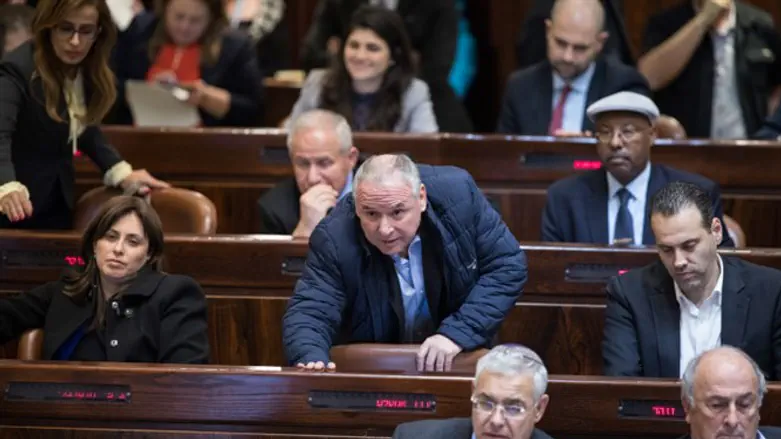
Senior sources in the coalition threatened Israeli Prime Minister Binyamin Netanyahu, saying that if his actions bring Israel to new elections, they will make sure to delay the elections by at least six months.
Israeli media have speculated that Netanyahu wants elections because of the rise in his popularity and have begun claiming that he is allowing the coalition crisis to continue intentionally. Netanyahu has not commented on the speculations, but has repeatedly said that elections will take place in 2019 as scheduled..
According to unnamed sources, if Netanyahu causes new elections to be held, several of the coalition's parties will join together and work with the opposition to ensure the elections are delayed until October.
On Saturday night, Netanyahu is scheduled to hold a special meeting with the haredi party heads, in an effort to reach a compromise on the "Draft Law." The meeting will include Netanyahu, UTJ representatives Moshe Gafni and Deputy Health Minister Yakov Litzman, Interior Minister Aryeh Deri (Shas), Tourism Minister Yariv Levin (Likud) and Environmental Protection Minister Ze'ev Elkin (Likud).
The coalition crisis began last month, when UTJ warned Netanyahu it would not support the passage of the 2019 budget unless the government backed a UTJ-backed amendment to the Draft Law.
Failure to pass the budget by the end of March would topple the Netanyahu government and lead to new elections.
Paragraph 36a of Basic Law: The Knesset, states: "Non-adoption of the Budget Law within three months subsequent to the beginning of the fiscal year will be considered to be a Knesset decision on its dispersion, prior to the completion of its term of service, on the day following the end of this period (hereafter: the determining date), and early elections will be held on the last Tuesday before the end of 90 days of the determining date, unless the Knesset decides by a majority vote of its members, within five days of the determining date, that because of the proximity of the date of elections to a holiday, festival day or memorial day, to postpone the elections to a date no later than 100 days from the determining date."
The bill proposed by UTJ would declare that the study of the Torah is a "basic value" of the State of Israel. As a result, the law would allow the government to circumvent the Supreme Court's ruling, after a suit was filed by secular Israelis, that exemptions for yeshiva students are discriminatory and enable it to grant draft exemptions or deferments to those enrolled full-time in a yeshiva institution.
Though the haredi parties are pushing or the law's passage, it has not yet been approved by the Ministerial Committee for Legislation.
Netanyahu is expected to agree to the bill, or an amended version of it without the Basic Law premise, in exchange for the haredi parties not promoting any more religious laws until the end of the coalition's term in late 2019.
He is expected to meet on Sunday with the leaders of all parties in the coalition.
"Netanyahu prefers to continue the government's work until the end of its term in November 2019," a spokesman for his office said. "In order for that to happen, we need all parties in the coalition to work together."
Meanwhile, Defense Minister Avigdor Liberman (Yisrael Beytenu) slammed the proposed compromise, saying, "For G-d's sake, there are times that you have to go with what you believe, and not with what is worth it or pays more. This is exactly that time."
On Friday, Liberman slammed the haredi parties' behavior, saying that the law "is not a compromise but capitulation to extortion. Anyone who wants to get involved in extortion should capitulate."
The proposed compromise includes amendments to the bill and was consolidated by Justice Minister Ayelet Shaked (Jewish Home) and Attorney General Avichai Mandelblit. Among other things, the plan is expected to include a target of 3,800 army and civil service conscripts from the haredi sector. The number will rise during each annual recruitment cycle. Failure to meet the target will lead to cancellation of the law, and assessment of successful recruitment will be carried out every five years. Sanctions imposed in that case would be mainly economic.
Liberman, for his part, is unwilling to accept the compromise, and insists Defense Ministry representatives be part of the discussions to find a solution.
